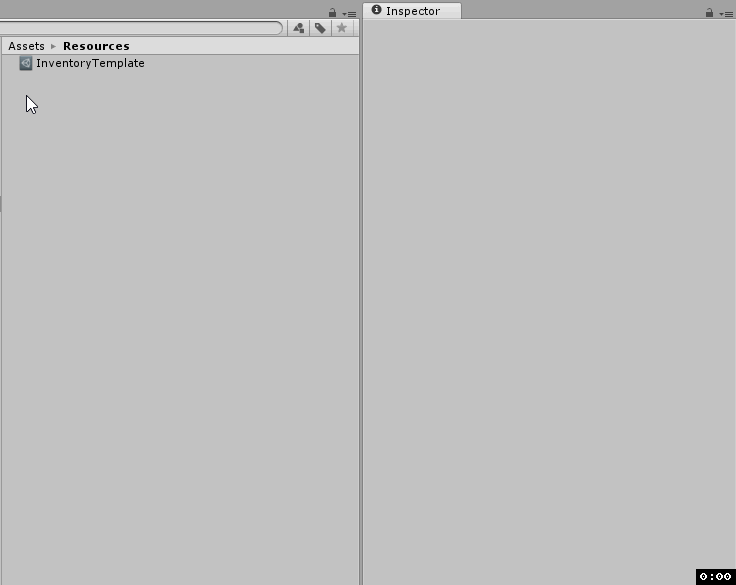An object database pattern for Unity3D.
This page is now maintained at http://toqoz.fyi/unity-object-database.html
Assigning object references through the Unity inspector is a great tool. Unfortunately though, it tends to really get in the way of doing code-based object instantiation; in particular, there’s no clean Unity-endorsed solution to making simple static classes which utilize game objects.
When I really need to solve this problem, I’ve been using a scriptable object database type solution. I’ll tie this post into my inventory post, where we needed a simple and tangle-free way to associate item names with game objects, because raw jsonified object references would change between builds.
What we want #
What we really want here is pretty basic. We just want a way to do something like ItemDatabase.GetActual("ruby"); and get back an asset – be it a prefab, scriptable object, sprite, whatever. A dictionary of sorts, basically. It also needs to be able to be accessed without first instantiating something in the scene – no MonoBehaviour.
The only way to achieve this is of course using Resources.Load() in some way.
Solution #
Let’s start with a really simple pseudo-dictionary implementation. I’m just using switch here because it’s much easier to demonstrate the concept with. If you’re using this kind of pattern for something serious, consider using a SerializableDictionary type (just copy in the Assets/SerializableDictionary folder into your project), which will make insertion / deletion far easier.
Check out
SoundDatabase.csin the github repo of this post for an example of a serializable dictionary being used in a solution like this.
// ItemDatabase.cs
[CreateAssetMenu(menuName = "Items/Database", fileName = "ItemDatabase.asset")]
public class ItemDatabase : ScriptableObject {
// Item objects.
public Item Ruby;
public Item Sapphire;
public Item Emerald;
public Item Amethyst;
public Item GetActual(string name) {
if (string.IsNullOrEmpty(name)) {
//Debug.Log("GetActual(): name is null or empty. You're either checking an empty slot or using this function incorrectly.");
return null;
}
switch (name.ToLower()) {
case "ruby": return Ruby;
case "sapphire": return Sapphire;
case "emerald": return Emerald;
case "amethyst": return Amethyst;
default:
Debug.Log("Could not find an Item for key \"" + name + "\", is it typed correctly?");
return null;
}
}
}
And create the corresponding scriptable object asset in your Resources folder:

Now we can resolve object references from a “pure code” class if we need to. Going back to our inventory example, we can get reliable item references without needing any “living” game objects:
// Item.cs
...
[System.Serializable]
public class ItemInstance {
public string ItemIdentifier;
public int Quantity = 1;
public Quality.QualityGrade Quality;
public bool IsNew;
private Item _item = null;
public Item item {
get {
if (_item == null) {
_item = ((ItemDatabase) Resources.Load("ItemDatabase")).GetActual(ItemIdentifier);
}
return _item;
}
}
public ItemInstance(string itemName, int quantity, Quality.QualityGrade quality, bool isNew) {
this.ItemIdentifier = itemName;
this.Quantity = quantity;
this.Quality = quality;
this.IsNew = isNew;
}
}
Take Note #
We now have a tangle free way to retrieve game object references. Resources.Load() is an excellent tool to know about, but make no mistake, assigning objects to MonoBehaviour variables is definitely the preferred solution most of the time. Doing so allows Unity to perform some space-wise optimizations and not include any unused assets in your builds. When we abandon this system, Unity is forced to include all assets in the Resources/ folder. Note: this includes objects that your database links to.
Some people really resent any use of the Resources/ folder. I feel as though this resentment is a little misguided sometimes. To my knowledge, the worst thing about using the Resources/ folder is that it potentially makes your build a bit bigger. This seems like a really insignificant trade-off when compared to the benefits that using it can bring–MonoBehaviour-only type problem solving can seriously get in the way of elegant code-based solutions. For these scenarios, I think it’s well worthwhile to make good use of Resources.Load().
To avoid any confusion, when I say MonoBehaviour-only type problem solving, I mean avoiding all use of the Resources/ folder and strictly assigning objects in the inspector (drag and drop).
A further point to note is that you probably shouln’t use something like this for huge databases. Loading all those assets into memory can take time. A solution might be to load the database once using an Init() method when the game starts.